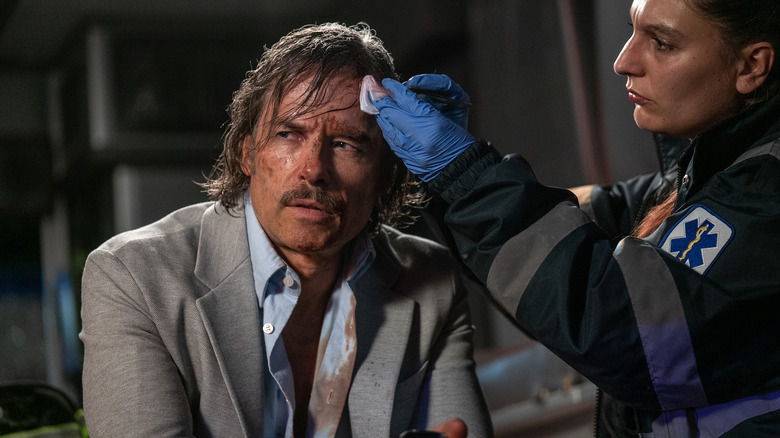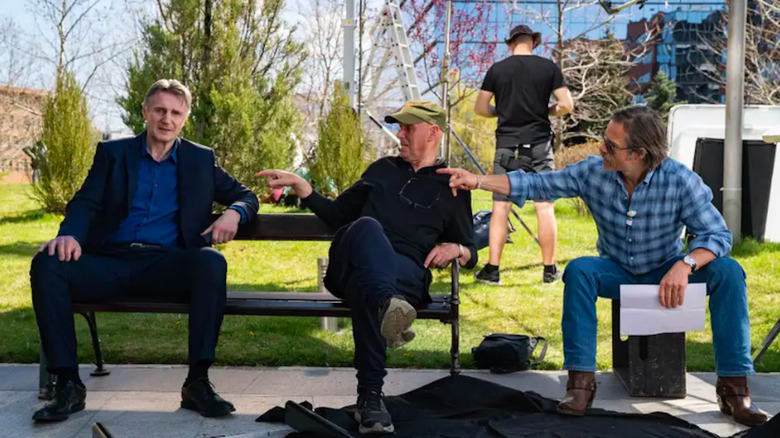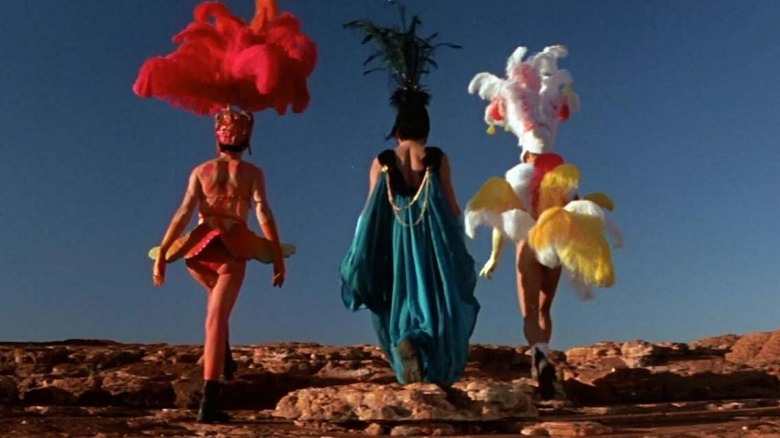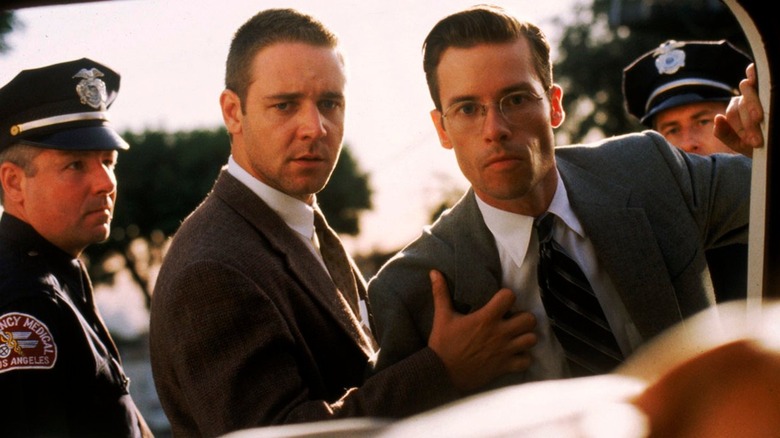Memory Star Guy Pearce On Making His Characters Feel Honest, And Memories From LA Confidential [Interview]
Guy Pearce is about as confident of a supporting player as a director can get in a movie. No matter the size of the role or often even the quality of the picture, Pearce is going to bring some authenticity to it. He's rarely ever had to make epic transformations to make audiences forget they're watching Guy Pearce on the big screen. He's never been an actor we associate with a persona or on-screen quirks, just naturally believable and compelling work.
Now, Pearce co-stars in Martin Campbell's latest thriller, "Memory." He plays Vincent Serra, a name that almost tells you everything you need to know about the FBI agent going up against the system and an assassin (played by Liam Neeson). While promoting the film, Pearce talked to us about how he approaches his roles in general, why he'll ask for fewer lines, and even shared memories of the late, great Curtis Hanson from "LA Confidential."
'There's a certain old fashioned quality to it, which I, as an oldish man can appreciate"
I usually talk to composers, not actors, from recording studios.
I'm at friend's recording studio, so I couldn't do this at home today. So I had to find somewhere else to do. I'm fortunately getting to sit here in front of all these lovely old synthesizers and drum machines, which is pretty cool.
Do you play any music?
I do play, I mean a little. I write music and I love being in recording studios, so I'll hopefully get to do something here. Maybe not today, but another day.
It's a nice backdrop. How was your Martin Campbell experience?
He's such a sort of energetic guy, but for someone of his age, he made me look like an old man. He was really quite energetic and fired up and [has] great energy for all of us on set.
Right. Sounds like Ridley Scott, someone with all that energy plus all of the years of expertise.
Yeah. I mean, Martin's literally, Ridley does as well, but it feels like Martin's literally running on set. I feel like I have a memory of Martin kind of going, "Okay, let's go. Right, bang." It's like wow, I better keep fit for this one. They're inspiring, these guys, and they don't want to stop. They really want to keep going and they've got such a wealth of knowledge and experience. It's just great. I love working with first-time filmmakers as well. I love working, finding that young ingenuity and hearing, seeing things in new ways, et cetera. But of course it's also wonderful working with guys that have been around for 40, 50 years, who just, you think, wow, you've seen so much and you've got such clever ways of doing things. It's inspiring.
Plus, they still make movies for adults.
Yeah. There's a certain old-fashioned quality to it, which I, as an oldish man can appreciate.
From the beginning, you tell a director what you need to do the job. Say in this instance, what conversations do you have with Martin Campbell about what you need?
Well, they were pretty simple and straightforward with Martin. I think the reason I feel I need to do that is because if you don't [have that conversation] somewhere early on, it can occur that you realize your level of communication is different. You are treated in a way that isn't right. I'm quite fussy about how I like to do things, but that fussiness is really just about wanting to be heard and not wanting to be fussed over. I don't like to be treated like a star. I can't stand it. I just keep saying to people all the time treat me like a grip. I'll come to work. I know what I need to do. I don't need you to come and tell me what to do. I know what to do.
With a director, I just want to know that if they don't know what they're doing, if they have a moment of going I'm not really sure how to do this, that they'll tell me that. Because I can see, I know it anyway. I need them to be completely honest with me because then I'll feel trusted by them. With Martin, as soon as I opened my mouth to say any of that stuff, he went, "Yeah, yeah, yeah. Of course." I'm like, okay, great, good. We don't even need to have the conversation. He just exudes a sensibility that I think is akin to my own, so we just clicked straight away.
"I don't have to do any work, all this happening for me"
Even though you're shooting in Bulgaria, you're playing a guy very much immersed in the world of El Paso, Texas. Obviously, movie magic, but are there certain traits or anything about the way of life in that part of Texas you still try to get right?
Well, funnily enough, I really did sort of have to remind myself of my times working in Texas and working in the south. I've worked in a couple of different places in America across the south. Georgia, Albuquerque, Austin, Texas, which are not El Paso, but I have been to El Paso. And funnily enough, only just the year before I had to go to El Paso, because I had to go to Mexico for a visa sort of changeover type thing, so I had to leave the country and come back in. So at least I'd had El Paso quite clearly in my mind and went across the border and came back again. I'm having to sort of draw on that all the time, I guess, particularly when you are somewhere like Bulgaria that is vastly different.
When we got to Bulgaria and started shooting and looking at some of the architecture, I went, oh yeah, this can work. That can work. This can work. Okay. As long as you put the extras in cowboy hats and they're not in some Bulgarian thing, then you're going to be okay. And it's funny too, because just straight after that, I did a film in Portugal that was also set down on the Mexican border, but in California. So there I was again, sort of imitating America in Europe, and it can be done.
I recently just finished a television series in the UK, but our final month was in Romania, which was doubling for Beirut. I was thinking, wow, how's that going to work? Of course I got there and I looked at the buildings and went, oh yeah. Totally. Sure, there is a bit of movie magic, but if you shoot it well, it doesn't have to be too much movie magic.
When you shoot movies, like "The Proposition," "Ravenous," and "The Rover" where you're really in those environments and feeling it, how much does that help you?
Well, I suppose on some level, the experience that I feel is that I know I'm away from home. Whether I'm in the correct location or a location doubling for the correct location, it to some degree doesn't really matter. All I know is that I'm away from my own home and that I'm in some foreign place. Sure, it would've probably felt different if I was in El Paso. But the other thing too is I suppose the thing that I'm focusing on, the thing that I'm wanting to exude when I'm playing a role is to get the emotional stuff of the character out.
What I'm focusing on is, as I say, just the internal workings of the character and making sure that feels honest. That usually comes about through the work that I've done on the script and rehearsals and talking with the director, et cetera.
Sure, it can make a difference. I remember when we did "Priscilla” and spent two weeks of rehearsing and trying to figure out this character. The first time we put those costumes on, I went, oh, wow, okay. I don't have to do any work, all this happening for me. Certain elements do help a lot, but quite often, the nature of a film as you know, is everything you shoot is all out of order anyway. So you are already dealing with a whole lot of elements that are not quite right.
"What a way to begin in America on a film like that"
Say for Vincent Serra, how do you want to get the internal workings right?
One of the first things I wanted to do, there was more dialogue for Vincent in the script. I just wanted to trim some of that out. I felt that it was important for him to just be economic because he's carrying a personal tragedy. He's the kind of guy that if he gets talking too much, he's actually going to break down in front of everybody. So that was the thing that felt important to me was Vincent to be saying to himself all the time, just do your job, just do your job, just do your job and not let the personal stuff get in the way.
If you're sort of carrying that, then our audience is going to feel that there's some personal thing just bubbling away there, which I think is good. I wanted him to be a man who felt tired and felt cynical and felt exhausted and felt that he's sort of at the end of his tether a little bit, but there's this natural fight, this sort of moral kind of calling that still exists in him. But it's probably exhausting him, particularly in the face of the personal tragedy that he's experienced himself. So, interesting stuff to play with.
It always seems like the best actors ask for lines of theirs to be cut.
Yeah. Usually, the less for me the better. I mean, it depends. It totally depends, but I do feel sometimes that something can be written, and then it's reiterated in a second line, and then it's slightly reiterated in a third line. I think I'd rather just say it once and then show you that I'm trying not to say it again, and that in itself says so much more than just saying it three times.
"LA Confidential" is one of my favorite movies, and I miss Curtis Hanson's voice in movies. As a director, he had such respect for the written word with movies like "8 Mile," "Wonder Boys," and of course, "LA Confidential." How was he as a communicator?
He was the best. He was the best. I miss him too on a very personal level. We became very, very close friends and he really became like a mentor for me. He was the first American film director I worked with, and it was my first American film. What a way to begin in America on a film like that, and with a director like that.
What I really realized about Curtis was that he made me see that as a director you've got to deal like this with this actor, you've got to deal like this with this actor, you've got to deal like this with this actor. He was able to just do that so beautifully and seamlessly between everybody because every actor is different and they need different things and some want lots of rehearsal and some want none.
Curtis just had a lovely calm, confident energy about him, which I found utterly compelling and wise. He just had a wisdom about him that was moving and lovely. He was cheeky and funny as well. He was delightful to be around. Really, as I say, he became a mentor for me, we became very close. And really, it was such a loss, him passing in 2016. So, I miss him too. And yes, I miss his work and I understand that other people miss his work too. And in a way he was a really interesting filmmaker because he really tried different things and was interested in different subjects. It's a shame to lose him.
He was such a great storyteller. Another filmmaker you obviously clicked with, John Hillcoat. When are you two going to work together again?
Yeah, I don't know. We talk to each other semi-regularly and we are very, very close and I have said to him, "Anything you want me to do, just call me and tell me to get on a plane and I'll come and do it." So no question, I would love to work with him again. A bit like Curtis, very different people, but just a genuine, warmhearted, honest, delightful person, which is funny also because they both made such violent films as well [Laughs].
"Memory" opens in theaters April 29, 2022.



